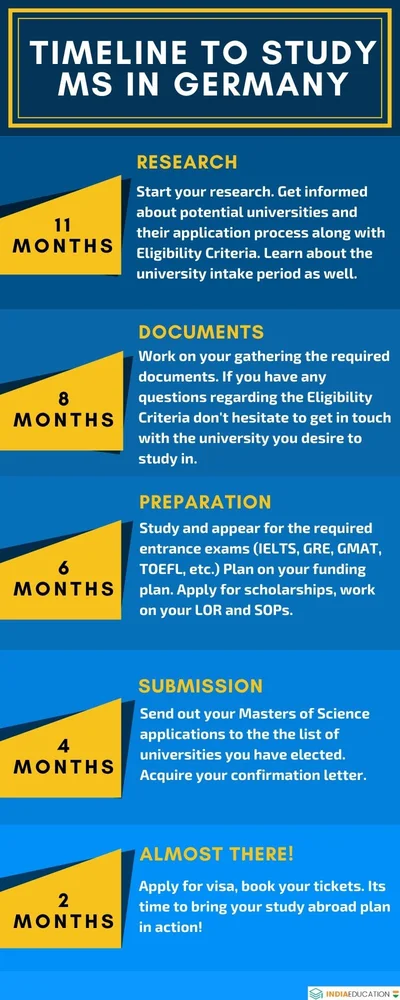
MS in Germany: Top Universities, Course, Eligibility and Fees.

Kritika Yadav
MS in Germany: This year, in 2022, the total number of international students in Germany has reached 416,437, ranking the country among the top 5 countries in the world with the highest number of international students. The country, notorious for attracting visitors for its Oktoberfest, is apparently drawing in the student population. So what is it about the country that is making international students choose to complete their Masters in Germany?

Germany has reared and bred some well-known academics, inventors, and scientists. Be it household names like Einstein; or the man behind the invention of dreamy vehicles like Porsche and BMW- Karl Benz, belong to Deutschland. We can safely say that Germany is responsible for the intellectual rearing of a number of Nobel laureates!
Germany has a global approach to education, along with a favourable environment for best-in-class academic training. The world student population is thus taking note of the education opportunities the country has to offer.
Table of Contents
Why MS in Germany?
Every study abroad venture comes with its fair share of pros and cons.
While studying abroad in any country has some common cons such as expense, culture shock, and long settlement period- international students looking for bright opportunities prefer looking at the benefits of studying at a particular destination. Here are some key features of studying abroad in Germany:
- High education standards
- Lower education costs compared to popular study abroad destinations
- Funding opportunities
- Work while studying
- Low Visa rejection rate
Notwithstanding the advantages of pursuing your Masters in Germany listed above, education in the country will take you to the forefront of technological advances, engineering, and scientific discovery.
Looking to learn about Management, Business, Entrepreneurship? Opt to study MBA in Germany, a degree that offers perfect and advanced level knowledge about the new generation businesses and administration!
How to Apply for MS in Germany?
If you want to know how to apply for MS in Germany, you must note that the country does not follow a universal testing scheme. Every university or school in Germany has a different or subjective application process. Thus, when applying for an MS in Germany, it is of utmost importance to consider each university’s application process in detail.
For instance, some German schools may accept your undergraduate degree as the necessary educational qualification mandatory to apply for a Master’s degree.
However, the same degree may not be accepted across some other universities in Germany.elit. Ut elit tellus, luctus nec ullamcorper mattis, pulvinar dapibus leo.
Another point to be noted is that several German universities offer free beginner German classes to help international students grasp the language. It is best to find out the same and make the best of this offered advantage.
However, there are some requirements to apply for MS in Germany:
- Valid GRE/GMAT scores for specific courses
- TOEFL/IELTS/ C1 advanced scores for English-language courses
- TestDaF (German as Foreign Language Test)/ DSH( German Language Test for the Admission of Foreign study applicants) for German-language courses
Read in detail: How to apply for a University in Germany
When to Apply for MS in Germany?
German universities work on a semester system. Here is a summary of the semesters followed by German universities:
Winter semester- October to March
For applying to the winter semester, a student must apply between March and June.
Summer semester- April to September
For applying to the summer semester, a student is expected to send completed applications between September and December.cing elit. Ut elit tellus, luctus nec ullamcorper mattis, pulvinar dapibus leo.
It is important to note that some German universities accept direct applications. When sending out direct applications, do ensure you know who the addressee is and that you are following the correct application procedure.
Top MS Courses in Germany
Germany offers competitive Ph.D., Masters and Bachelor programs in almost every field a student can imagine or hope for. Here is a list of popular education stream opted for MS studies in Germany-
| S.NO. | MS courses in Germany | Universities |
| 1 | MS in Electrical Engineering | KIT, RWTH Aachen, TUM, TU Berlin |
| 2 | MS in Computer Science | TUM, TU Darmstadt, University of Freiburg |
| 3 | MS in Automotive Engineering | TU Berlin, Universität Stuttgart |
| 4 | MS in Chemical Engineering | TU Berlin, TU Munich, Karlsruhe Institute of Technology, RWTH Aachen |
| 5 | MS in Robotics | TUM, TU Dortmund |
Eligibility Criteria – Documents Required for MS in Germany
While each university application requirements may differ, the primary documents required for MS in Germany applications include-
- Valid/required entrance exam proof (GRE/GMAT/SAT and Language Proficiency Test)
- Certificate/Mark sheet of the latest educational qualification
- CV/Resume
- Statement of Purpose
- Letter of Recommendation
- Copy of Passport
Once these documents and other requirements are fulfilled and accepted, international students must apply for their student visa. They may apply for a Residence permit visa or German type D visa.
MS in Germany language barriers
Several international students are daunted by the fact that German is widely spoken, encouraged, and preferred for studying in Germany. While this could have been the case some years back, things have now changed. German still remains a difficult language to master. However, German universities have become relaxed at using German as the language of instruction. A number of schools in Germany teach courses fully in English.
Considering social barriers, you might face some difficulty- feeling like an outsider at times is inevitable-be it any country you choose to study your Master’s degree in. However, due to diversifying atmosphere and multi-cultural environment, the social mindset is undergoing transformation. You are likely to find more and more German students eager to help you out with your language in exchange for help with their English! So, find the right crowd that can help you overcome these language barriers and you will be good to go!
Top MS universities in Germany
Many universities in Germany are considered among the best in the world, especially for pursuing Masters in- Science. Germany is the ‘it’ destination for several international students aspiring to acquire an MS-based degree.
Below listed are the best MS universities in Germany.
| S.NO. | University | QS Ranking 2022 |
| 1 | Technical University of Munich | 50 |
| 2 | Ruprecht-Karls-Universität Heidelberg | 63 |
| 3 | Ludwig-Maximilians-Universität München | 64 |
| 4 | Freie Universität Berlin | 127 |
| 5 | Humboldt University of Berlin | 128 |
| 6 | KIT, Karlsruhe Institute of Technology | 136 |
| 7 | Technical University Berlin | 159 |
| 8 | RWTH Aachen University | 165 |
MS in Germany Fees
Yes, it is true Germany is one of the countries that offer affordable education and also is counted among the top 3 countries for higher education worldwide. The high-quality education in Germany will not only develop and enrich your knowledge but also give you the benefits of acquiring a career that is recognized on a global scale.
There are two types of universities you can enroll in for pursuing a Masters of Science in Germany – Public universities in Germany and Private universities in Germany. The tuition cost in public universities is fairly cheaper than private universities.
The pocket-friendly education system will easily allow you to experience studying abroad to the most. The average cost of studying in Germany for an Indian student ranges from 300 Euros up to 20,000 Euros 11,825 INR to 2,73,465 INR per annum. One can also study in universities of Germany for a Masters in Science at free of cost.
So, if you want to pursue your higher education with fairly low tuition costs – choose Germany.
Cost of MS in Germany for Indian students
The cost of doing your masters in Germany is comparatively cheaper than studying in any other country. Germany is considered one of the most affordable countries to study in. Here’s the list of colleges with their approximate tuition fees for MS in Germany for Indian students.
| S.NO | Universities | Tution Fees in INR |
| 1 | University of Freiburg | 1,32,000 |
| 2 | University of Wuerzburg | Free + Semester contribution fee of 12,144 |
| 3 | The Humboldt University of Berlin | Free + University Registration fee of around 26,400 |
| 4 | Ludwig Maximilian University of Munich | Free + 11,387 for Student Services |
| 5 | Free University of Berlin – [FU-BERLIN] | Free |
| 6 | The University of Bonn | Free + Administration fee of 26,400 per semester |
| 7 | RWTH Aachen University – [RWTH] | Free + 26,345 Social contribution fees |
| 8 | Karlsruhe Institute of Technology – [KIT] | 132,000 |
Cost of living in Germany for Indian students
It might come across that studying abroad is expensive considering the factors such as moving to an entirely different country. However, in comparison to other top educational countries in Europe, Germany is reasonably affordable. The expenses, of course, would be slightly costlier than your current expenditure.
It is best to first configure the list of basics or items you would need to survive while studying in Masters in Germany. Let’s break down the list of expenses in categories and calculate the average amount required on a monthly basis,
| Expense Type | Cost per month (INR) |
On-campus Accommodation | 24,906 |
Off-campus Accommodation | 33,208 –37,359 |
| Food and Drink | 14,113 |
| Transportation | 2,075 – 16,604 |
| Books & Material | 1,660 |
| Internet | 2,905 |
| Miscellaneous | 6,641 |
Read: Accommodation in Germany
Jobs after MS in Germany
Securing your future with a globally recognized degree is a step-up to acquiring plenty of opportunities. Many Indian students apply and accumulate jobs by studying MS in Germany. If you are planning to get your degree of Masters in Science from Europe’s trusted education destination, then here’s the list of jobs in Germany after MS with average annual salary.
| S.NO. | JOBS | Annual Salary (INR) |
| 1 | Electrical Engineer | 1.12 crore |
| 2 | Accountant | 75.30 lakhs |
| 3 | Civil Engineer | 1.04 crore |
| 4 | Mechanical Engineer | 1.10 crore |
| 5 | Data scientist | 1.12 crore |
| 6 | Architect | 1.02 crore |
| 7 | Biomedical Engineer | 95.47 lakhs |
| 8 | Pharama Researcher | 1.24 crore |

FAQs
It might depend on your stream of study. It usually takes about 2 years to complete a full-time course of MS in Germany. You can also find comparatively short MS programs in Germany that last up to 12 months or 18 months.
CGPA is one of the elements you should considering scoring well on. A minimum score of 6.5 – 7 CGPA is a requirement at the universities in Germany. In case you are not confident about your CGPA, we suggest appearing for GRE. GRE scores are highly considered by the universities.
The cost of doing Masters in science from Germany for an Indian student can cost from 11,825 INR to 2,73,465 INR per annum. This is basically the tuition fees that the university charges.
Yes, there are some free master’s programs in Germany. This essentially means that most public universities in Germany do not charge tuition. The other costs associated with pursuing a Master’s in Germany, however, are the cost of living and small semester fees.
Yes, GRE is a compulsory requirement at universities of Germany for Masters, specifically for those aspiring to pursue further education in the stream of STEM (Science, Technology, Engineering, and Management). You can check the complete Eligibility Criteria for studying MS in Germany for Indian students.
Yes, many Indian students have successfully graduated and found exciting jobs in and around Germany. You can also explore opportunities within Europe (countries that are permitted on the Schengen visa). Know more about job or career prospects after MS in Germany.
Germany is considered among the countries that offer affordable living and education. With thorough research we are sure you can master and experience quality education from affordable universities in Germany. Also, check out the breakdown for studying Masters in Germany.
According to duetschland.de, the top five cities in Germany where you can find affordable education are –
- Leipzig
- Dresden
- Jena
- Halle/Saale
- Kaiserslautern
If you are planning to visit to study MS in Germany as soon as you complete your undergraduate degree, we recommend preparing in your 2nd year of college. In case, you are planning to acquire a year or two worth of experience before going for higher education in Germany start working on your applications at least a year before.
Related Links
Latest News
People Reading Now

CBSE Compartment Result 2023 OUT: Click For Direct Link



CSAB 2023: Special Round Registration Begins Today

